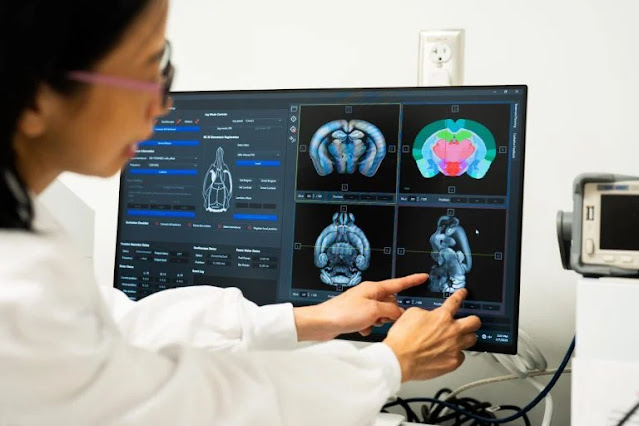Chin-Yi Chen, a research scientist at Virginia Tech’s Fralin Biomedical Research Institute, works in assistant professor Fred Wu’s lab to develop a technique that uses focused ultrasound to deliver creatine directly to the brain.
Credit: Lena Ayuk/Virginia Tech
Focused ultrasound could turn a muscle supplement into a brain-saving therapy by sneaking creatine past the brain’s protective shield.
Virginia Tech researchers, backed by a new grant, are testing focused ultrasound that slips creatine across the blood-brain barrier, where it fuels ATP production and steadies critical brain signals. Low creatine can stunt development despite bulking up muscles, so the team hopes their sonic shortcut will restore learning, memory, and speech in patients who still struggle even after taking supplements.
Creatine: Beyond Bodybuilding
Creatine is widely recognized as a supplement that helps build muscle, but its role in human health goes far beyond the gym. In some cases, it can make the difference between life and death.
“Creatine is very crucial for energy-consuming cells in skeletal muscle throughout the body, but also in the brain and in the heart,” said Chin-Yi Chen, a research scientist at Virginia Tech’s Fralin Biomedical Research Institute at VTC.
Chen is part of a team exploring a novel method for delivering creatine directly to the brain using focused ultrasound. The research, led by Assistant Professor Cheng-Chia “Fred” Wu at the Fralin Biomedical Research Institute, has received a $30,000 grant from the Association for Creatine Deficiencies to support this work.
Fueling the Brain’s Circuits
Inside the brain, creatine plays a key role in generating cellular energy. It works alongside phosphoric acid to help produce adenosine triphosphate (ATP), a molecule that powers nearly every function in living cells. Beyond energy production, creatine also influences the way brain cells communicate.
One of its key effects is on the brain’s primary inhibitory system, which relies on the neurotransmitter gamma-aminobutyric acid. This system helps regulate brain activity and has been linked to functions such as learning, memory, brain development, and the prevention of seizures.
Emerging research also suggests that creatine may act like a neurotransmitter itself. It is transported to neurons from glial cells and appears to play a role in how brain cells signal to one another. When creatine levels are low, the impact can go beyond weakened muscles or heart function. A deficiency can severely impair brain development. While creatine supplements often help patients gain weight and muscle mass, many still experience developmental delays that affect speech, reading, and writing.
Cracking the Brain Barrier
This is largely caused by the brain’s protective blood-brain barrier. This selective shield blocks harmful substances like toxins and pathogens from entering brain tissue, but it can also prevent beneficial compounds like creatine from reaching the brain when levels are low.
Wu studies therapeutic focused ultrasound, which precisely directs sound waves to areas of the brain to which access has been opened temporarily. The process allows drugs to reach diseased tissue without harming surrounding healthy cells. While Wu is investigating this method as a potential treatment for pediatric brain cancer, he also sees potential in applying it to creatine deficiency.
“Through the partnership between Virginia Tech and Children’s National Hospital, I was able to present our work in focused ultrasound at the Children’s National Research & Innovation Campus,” Wu said. “There, I met Dr. Seth Berger, a medical geneticist, who introduced me to creatine transporter deficiency. Together, we saw the promise that focused ultrasound had to offer.”
From Lab to Patients
The Focused Ultrasound Foundation has recognized Virginia Tech and Children’s National as Centers of Excellence. Wu said the two organizations bring together clinical specialists, trial experts, and research scientists who can design experiments that could inform future clinical trials.
“It was a moment that made me really excited — that I had found a lab where I could move from basic research to something that could help patients,” Chen said. “When Fred asked me, ‘Are you interested in this project?’ I said, ‘Yes, of course.’”
Because creatine deficiencies can impair brain development, the early stages of Chen’s project will concentrate on using focused ultrasound to deliver creatine across the blood-brain barrier. Chen hopes the technique will restore normal brain mass in models of creatine deficiency.
The Life of Earth
https://chuckincardinal.blogspot.com/


No comments:
Post a Comment
Stick to the subject, NO religion, or Party politics